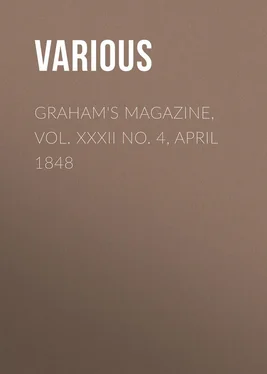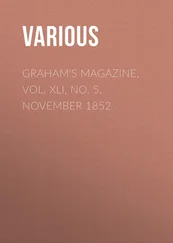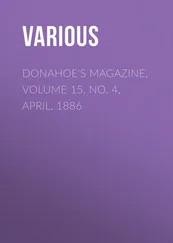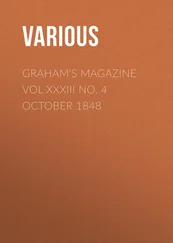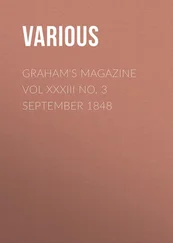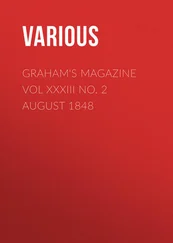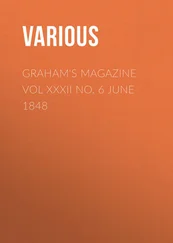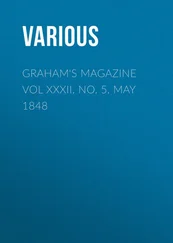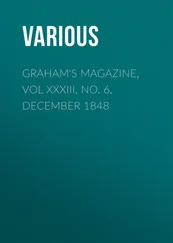Various - Graham's Magazine, Vol. XXXII No. 4, April 1848
Здесь есть возможность читать онлайн «Various - Graham's Magazine, Vol. XXXII No. 4, April 1848» — ознакомительный отрывок электронной книги совершенно бесплатно, а после прочтения отрывка купить полную версию. В некоторых случаях можно слушать аудио, скачать через торрент в формате fb2 и присутствует краткое содержание. Издательство: Иностранный паблик, Жанр: periodic, literature_19, foreign_edu, на английском языке. Описание произведения, (предисловие) а так же отзывы посетителей доступны на портале библиотеки ЛибКат.
- Название:Graham's Magazine, Vol. XXXII No. 4, April 1848
- Автор:
- Издательство:Иностранный паблик
- Жанр:
- Год:неизвестен
- ISBN:нет данных
- Рейтинг книги:4 / 5. Голосов: 1
-
Избранное:Добавить в избранное
- Отзывы:
-
Ваша оценка:
- 80
- 1
- 2
- 3
- 4
- 5
Graham's Magazine, Vol. XXXII No. 4, April 1848: краткое содержание, описание и аннотация
Предлагаем к чтению аннотацию, описание, краткое содержание или предисловие (зависит от того, что написал сам автор книги «Graham's Magazine, Vol. XXXII No. 4, April 1848»). Если вы не нашли необходимую информацию о книге — напишите в комментариях, мы постараемся отыскать её.
Graham's Magazine, Vol. XXXII No. 4, April 1848 — читать онлайн ознакомительный отрывок
Ниже представлен текст книги, разбитый по страницам. Система сохранения места последней прочитанной страницы, позволяет с удобством читать онлайн бесплатно книгу «Graham's Magazine, Vol. XXXII No. 4, April 1848», без необходимости каждый раз заново искать на чём Вы остановились. Поставьте закладку, и сможете в любой момент перейти на страницу, на которой закончили чтение.
Интервал:
Закладка:
"Did she ever mention me?" said Ella.
"Last night she said if you would come, that she could die contented."
"Then lead me to her quickly."
They silently bent their steps to the sick chamber, and coming to the door, both made an involuntary pause.
"She is sleeping," said the old lady, softly; but Ella was too much struck to make reply. She was thinking of the dreadful changes which had come over that frail being since last they met. Worn down to a skeleton, her lips compressed, as if in agony, her dark hair thrown back upon her shoulders, while her cheeks were pale as the marble so soon to be raised in her memory, which, with the glimmering of the lights, served to make it a too dismal scene. Staggering forward to a chair, she sat down quickly, but in the agitation there was a slight noise – it awakened the sleeper; a moment passed – they were in each others arms. When the first wild burst of joy had passed away, Mary spoke.
"Sit down here, Ella – I want to be alone with you; I feared that I might die before you came;" a convulsive shuddering passing over her, as she spoke of death. "I want to give you my history. 'T is? a dark picture, and yet it has all been mine."
"But are you not too weak and agitated?" asked the warm-hearted friend.
"Oh, no! that sweet, quiet sleep has so refreshed me, that I feel almost like another being – and I shall be very brief. But to my story. You recollect my having often told you that I never set my heart on an earthly object but I was doomed to bear a bitter disappointment. That wary, stubborn rock, encircled by the whirl of youthful and enthusiastic feeling, which, in life's earlier years, drew within its circled waves my frail bark of love and hope, then cast it forth – a wreck forever.
"In the village in which I was raised, lived one who shared with me the sports of childhood; and as we grew older, partook of the recreations and amusements of the young together. There was a strange similarity in our tastes and dispositions; and we consequently spent much of our time in each others society. There were those who sometimes smiled to see a young and sunny-haired youth so constantly with the sensitive, shrinking Mary Warner; but then they knew we were playmates from childhood, and thought no more. Mother was dead, and I was under the guidance of my remaining parent, an only child – an idolized and favored one; and in my sixteenth year, claimed as the bride of Samuel Wayland. Parental judgment frowned, and called it folly. What could I do? Our faith had long been plighted, but filial respect demanded that should be laid aside; yet what was I to find in the future, that would ever repay for the love so vainly wasted. It was all a blank. I nerved my heart for our last meeting – but the strings were fibrous, and they broke.
"'I shall go to the West, and then you must forget me,' said I, when we came to part.
"'Never, Mary, will you, can you be forgotten!'
"We parted there, forever. He is still living, a lone wanderer on the earth; we have never had any communications; but there is a unity of feeling, a oneness of spirit, that at times make me feel as if we were scarcely separated. I enjoy a pleasure in thinking of his memory, a confidence that would trust him any where in this wide world; and I now believe that wherever he is, his heart is still true to me. As for me, I have hurried through life like a 'storm-stricken bird,' no rest from the busy scenes in which I mingled. Since then, there have been proposals in which honor, wealth, and distinction were connected; and once I had well nigh sold myself for interest, and to please my father. We were promised, and I was congratulated on my happy prospects; but, alas! alas, for me; the more memory reverted to the past, my feelings revolted from the present. I sometimes used to stand where I could see him pass in the street, and exclaim 'oh, heaven! can I marry that man! can I stand before God's altar, and promise to love and honor him, when I abhor his presence.' Time was hasting; one night I went down into the study; father was sitting there.
"'Well, Mary,' said he, 'I suppose you will leave us soon.'
"That was enough for my pent-up feelings to break forth. 'I suppose so,' said I, 'but, oh! father, I would rather see my grave open to-morrow, than to think of uniting my destiny with that man. My very soul detests him."
"Mary, sit down now, and write a letter to Mr. M – , that you cannot keep your promise, and the reason why. Far would it be from me to place in the hands of my only daughter, the cup of misery unmixed. My judgment and your feelings differ.'
"It was late that night when I sealed the fated letter for M – ; but I retired and slept easy, there was a burden removed which had well-nigh crushed me. What I have experienced since, words may never tell; the young have deemed me impenetrable to the natural susceptibilities of our natures, while the old have called me trifling. But, Ella, depend upon it, a heart once truly given, can never be bestowed again. I have erred in trying to conceal my history in the manner I have. Instead of placing my dependance on the goodness of the Most High, and seeking for that balm which heals the wounded spirit, and acquiring a calmness of mind which would render me in a measure happy, I plunged into the vortex of worldly pleasure. But it is all over now; they say I have the consumption, and pity me, to think one so joyous should have to die. To-day has been spent mostly in meditation; and I have tried to pray that my Savior would give me grace for a dying hour; and, Ella, will you kneel at my bedside and pray as you used to, when a young, trembling girl?"
"Yes, I will pray for you again," said Ella; "but take this cordial to revive your exhausted frame."
As the friend raised the refreshing draught, she marked such a change in Mary's countenance, that her heart quailed at the thought of the terrible vigil she was keeping, in the silence of night, alone. She kneeled by the sick, and offered up her prayer with an energy unknown to her before, such a one as a heart strong in faith, and nerved by love and fear alone could dictate; a pleading, borne on high by the angel of might, for the strengthening of the immortal soul in prison-clay before her. There was a sigh and a groan; she rose hastily and bent over the couch – there was a gasping for breath, and all was still. Ella's desolate shriek of anguish first told the tale, that Mary was dead.
Thus passed again to the Giver, a mind entrusted with high powers, and uncontrolled affections, who, in the waywardness of youth, cast unreservedly at the shrine of idolatrous love, her all of earthly hopes, then wandered forth with naught but their ashes, in the treasured urn of past remembrance, seeking to cover that with the mantle of the world's glittering folly.
TO THE AUTHOR OF "THE RAVEN."
BY MISS HARRIET B. WINSLOW
Leave us not so dark uncertain! lift again the fallen curtain!
Let us once again the mysteries of that haunted room explore —
Hear once more that friend infernal – that grim visiter nocturnal!
Earnestly we long to learn all that befalls that bird of yore:
Oh, then, tell us something more!
Doth his shade thy floor still darken? dost thou still, despairing, hearken
To that deep sepulchral utterance like the oracles of yore?
In the same place is he sitting? Does he give no sign of quitting?
Is he conscious or unwitting when he answers "Nevermore?"
Tell me truly, I implore!
Knows he not the littlenesses of our nature – its distresses?
Knows he never need of slumber, fainting forces to restore?
Stoops he not to eating – drinking? Is he never caught in winking
When his demon eyes are sinking deep into thy bosom's core?
Tell me this, if nothing more!
Интервал:
Закладка:
Похожие книги на «Graham's Magazine, Vol. XXXII No. 4, April 1848»
Представляем Вашему вниманию похожие книги на «Graham's Magazine, Vol. XXXII No. 4, April 1848» списком для выбора. Мы отобрали схожую по названию и смыслу литературу в надежде предоставить читателям больше вариантов отыскать новые, интересные, ещё непрочитанные произведения.
Обсуждение, отзывы о книге «Graham's Magazine, Vol. XXXII No. 4, April 1848» и просто собственные мнения читателей. Оставьте ваши комментарии, напишите, что Вы думаете о произведении, его смысле или главных героях. Укажите что конкретно понравилось, а что нет, и почему Вы так считаете.
